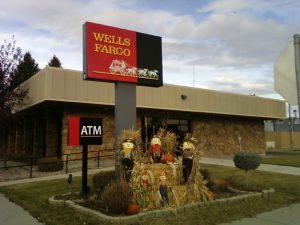(Akiit.com) While our attention was focused last week on Bill Clinton becoming unhinged while defending his indefensible crime bill and insulting the Black Lives Matter Movement in the process, Wells Fargo and billionaire casino magnate Sheldon Adelson were demonstrating how the wealthy escape personal responsibility when they misbehave badly.
In the case of Wells Fargo, bank executives agreed to pay a $1.2 billion fine for hiding their bad loans leading up to the 2008 housing market debacle. The bank admitted certifying that thousands of faulty home mortgage loans were eligible for Federal Housing Administration insurance when, in fact, they weren’t.
“Wells Fargo enjoyed huge profits from its FHA loan business, the government was left holding the bag when the bad loans went bust,” Manhattan U.S. Attorney Preet Bharara said in a statement Friday announcing the settlement. “Today, Wells Fargo, one of the biggest mortgage lenders in the world, has been held responsible for years of reckless underwriting.”
Not really.
What the settlement does is extract a large fine, but let the culprits personally responsible escape punishment. For example, Wells Fargo executive Kurt Lofrano acknowledged hiding bad loans, but was not fined and will not face any criminal charges.
We can safely infer that the deal cut with Wells F argo was done to get the case resolved. I get that. But despite former presidential candidate Mitt Romney’s claim that corporations are people, a corporation did not commit these crimes – people did. And those people should be held accountable for violating the law.
argo was done to get the case resolved. I get that. But despite former presidential candidate Mitt Romney’s claim that corporations are people, a corporation did not commit these crimes – people did. And those people should be held accountable for violating the law.
As part of the settlement agreement, Lofrano, vice president of credit risk and quality assurance for Wells Fargo, admitted his team identified 2,900 problematic loans between 2005 and 2010, but reported only 300 as troublesome.
Sadly, Wells Fargo was not alone.
The subprime mortgage crisis that caused many Americans to lose their homes involved some of the best known brands in the U.S. Earlier, JPMorgan Chase agreed to pay a fine of $13 billion, Goldman Sachs settled for $5.1 billion and Morgan Staley was fined $2.6 billion.
Again, no criminal charges have been brought against the “banksters” themselves.
Meanwhile, in a press release, the Securities and Exchange Commission announced,
that “Las Vegas Sands Corp. has agreed to pay a $9 million penalty to settle charges that it violated the Foreign Corrupt Practices Act (FCPA) by failing to properly authorize or document millions of dollars in payments to a consultant facilitating business activities in China and Macao.
“An SEC investigation found that LVS kept inaccurate books and records and frequently lacked supporting documentation or proper approvals for more than $62 million in payments to a consultant in Asia. The consultant acted as an intermediary to obscure the company’s role in certain business transactions such as the purchases of a basketball team and a building in China, where casino gambling isn’t permitted.”
The investigation was launched more than five years ago when a former Sands executive Steve Jacobs alleged improprieties in Macao, a Chinese territory that is the world’s largest gambling center. The SEC and the Justice Department were looking into whether the company had violated the Foreign Corrupt Practices Act, which prohibits U.S. companies from bribing officials of foreign governments.
In the end, the SEC didn’t directly accuse Sands of paying bribes, but said it violated provisions of the law that require companies to maintain proper financial controls.
The SEC stated: “LVS consented to the SEC’s order without admitting or denying the findings that it violated the books-and-records and internal controls provisions of the Securities Exchange Act of 1934.”
In case after case, other companies strike similar deals. It’s not like they are making a donation to charity. They have clearly violated the law, but officials don’t have to acknowledge any wrongdoing. Instead, they pay the fines, in the words of the SEC, “without admitting or denying the findings.”
It’s tough to see low-level drug users being over prosecuted while companies such as Wells Fargo and the Las Vegas Sands Corp., owned primarily by Sheldon Adelson, take a corporate financial hit, but their leaders have no fear of being personally prosecuted for their misdeeds.
We also see how the high and mighty cut special deals in other situations.
Former House Speaker Dennis Hassert, for example, has acknowledged sexually abusing at least five Illinois boys when he was their high school wrestling coach. He paid one of them nearly $2 million in hush money. Hastert pleaded guilty in October to a single felony count of illegally structuring cash withdrawals to evade federal bank currency reporting requirements.
Despite that clear misuse of power as a teacher and coach, Hassert’s plea agreement with prosecutors recommends a sentence ranging from probation to up to six months in prison, the lowest possible sentence under federal guidelines for a felony conviction. The maximum is five years.
In addition to seeing Black and Brown people disproportionately imprisoned, looking at how banking officials and political figures are extended undeserved leniency are reminders that our criminal justice system is anything but just.
Columnist; George Curry
Official website; http://twitter.com/currygeorge








Leave a Reply